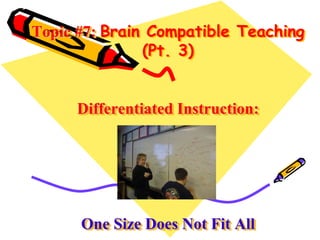
Topic 7: Brain Compatible Teaching (Part3): Differentiated Instruction
- 1. Topic #7: Brain Compatible Teaching (Pt. 3) Differentiated Instruction: One Size Does Not Fit All
- 6. Let’s Play: The Deep Breathe Sticky Fingers Be a Hero/Carwash
- 11. Think WinWin
- 12. How do we help students to get “in the zone”? Working Interactively Winning Independently
- 15. Teachers Need to Model In everything they do
- 16. BIG QUESTION: What DI Strategies can help us as teachers to meet the needs of our students?
- 18. Options for Differentiated Instruction How do we get to know our students BEFORE we teach them?
- 20. Myers-Briggs Personality Type http://www.personalitypathways.com/type_inventory.html Learning Styles Inventory http://www.engr.ncsu.edu/learningstyles/ilsweb.html True Colors Personality Test http://www.truecolorscareer.com/quiz.asp Emotional Intelligence Inventory http://www.ihhp.com/quiz.htm Brain Dominance http://brain.web-us.com/brain/braindominance.htm Multiple Intelligence Inventory http://www.personal.psu.edu/staff/b/x/bxb11/MI/MIQuiz.htm Visual/Tactile/Auditory Learners » Learning Styles Test 1 I.Q. Tests http://www.wizardrealm.com/tests/intelligence.html The Gray-Wheelwright-Winer 4-letter Type Indicator Test http://www.gesher.org/gwtest/gwtest.html Kolb’s Learning Styles Inventory: http://chat.carleton.ca/~tblouin/Kolb's%20Leaning%20Styles%20Mode l/kolbs%20test.htm
- 23. Learning Task: DI Experts • Gather in your “Tech Teams” • Create a “Concept Map” or “Mind Map” for the DI strategy that your team is assigned to • Use digital tools such as https://bubbl.us/ or http://www.gliffy.com/ • Share using Twitter (#EDES340)
- 38. Mastery Learners: % of “at risk” - 12% % of population= ____ Interpersonal Learners:% of “at risk” - 63% % of population= ____ Want to learn practical information and procedures. Like drills, lectures, demonstrations, and practice. May experience difficulty when learning becomes too abstract or when faced with open-ended questions. Learn best when instruction is focused on modeling new skills, practicing, and feedback sessions. Want to learn about things that affect people’s lives. Like group experiences, discussions, cooperative learning activities, role playing, personal attention. May experience difficulty when instruction focuses on independent seatwork or when learning lacks real-world application. Learn best when their teacher pays attention to their successes and struggles. Understanding Learners: % of “at risk” - 1% % of population= ____ Self-Expressive Learners: % of “at risk” - 24% % of population= ____ Want to use logic, debate, and inquiry to investigate ideas. Like reading, debates, research projects, independent study, making cases or arguments, asking “Why?” May experience difficulty when there is a focus on the social environment of the classroom (e.g. cooperative learning) Learn best when they are challenged to think and explain their ideas. Want to use their imaginations to explore ideas. Like creative and artistic activities, open-ended & non-routine problem, generating possibilities and alternatives, asking “What if?” May experience difficulty when instruction focuses on drill and practice and rote problem solving. Learn best when they are invited to express themselves in unique and original ways.
- 39. Numeracy Add the %s into the blanks: 2% 6% 12% 12% 36% 38% 38% 56%
- 40. What is your teaching style? How will you teach your students who have different learning styles? How will you differentiate?
- 41. THINK Differently “If we want to have engaged brains in the classroom, we have to have an interactive environment” …Spencer Kagan “Fairness is everyone getting what they need in school” …Martha Kaufeldt “All kids in our society are at risk …Dr. Martin Brokenleg “We have school-induced ADHD because schools aren’t brain compatible with the brains of today’s children” …Dr. David Sousa “Kids don’t start at the same place, they don’t learn in the same way, and they don’t learn at the same pace” …Linda Darling-Hammond “’At risk’ students are those who leave school before or after graduation with little possibility of continuing learning” …Roland Barth There are no ‘bad’ kids, just kids with ‘bad’ problems” …Harold Brathwaite “Students lose motivation to learn because they don’t have the skills to know how to learn.” …Harvey Silver “Fair isn’t always equal” …Rick Wormeli “All children have intelligence. We have asked the wrong question. We ask how much. We need to ask what kind. …Mary Meeker
- 42. Differentiated Instruction: Think WinWin What “WinWin” idea will you take with you today to help better meet the needs of your learners?